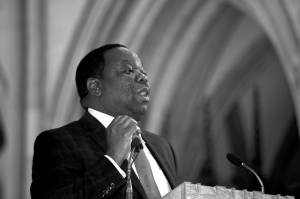The 31 July presidential election in Zimbabwe pitted Robert Mugabe, the African country’s president for 33 years, against his long-time political rival Morgan Tsvangirai in a contest that, according to Western analysts, could have brought major change to one of Africa’s poorest countries. While this assessment was largely predicated on hopes of victory for Mr. Tsvangirai, Mugabe’s victory appears to be a validation of his party’s efforts toward economic growth and political liberalization.
Zimbabwe’s 2008 presidential election was, like many other African elections around that time, marred by violence that killed twenty people and injured up to ten thousand. Mr. Tsvangirai won a slim majority of votes in the first round, forcing a runoff that saw Mr. Mugabe’s reelection and the establishment of a power-sharing agreement between the two men, in which Mr. Tsvangirai served in the margins as Prime Minister. In the intervening five years Mr. Mugabe’s government addressed many of the issues that have plagued Zimbabwe for decades, including severe hyperinflation, food insecurity, and land ownership. By following a neo-liberal economic plan focusing on development through foreign investment, Mr. Mugabe’s popularity has soared compared to 2008.
Keeping these changes in mind, Western media outlets should not be surprised by Mr. Mugabe’s win. Instead, many newspapers took Mr. Tsvangirai’s popular support for granted, with TIME magazine going so far as to run an article titled “Will Robert Mugabe Bow Out to Morgan Tsvangirai?” in which analysts debated whether Mr. Mugabe would allow the elections to go ahead without interference.
The truth behind allegations of Mr. Mugabe’s electioneering remains unclear. Western leaders have denounced the results, with US Secretary of State John Kerry saying “in light of substantial electoral irregularities reported by domestic and regional observers, the United States does not believe that the results announced today represent a credible expression of the will of the Zimbabwean people.”
However, some observers seem less concerned with alleged irregularities and more focused on continued stability and prospects for growth in Zimbabwe. UN Secretary General Ban Ki-Moon praised Zimbabweans for holding “broadly peaceful” elections and “exercising their democratic rights.” Other observers, including the South African Development Community (SADC), the African Union, and the Common Market for Eastern and Southern Africa (COMESA), released reports calling the elections generally free and fair.
In spite of these reports, Mr. Tsvangirai has vowed to “pursue peaceful, legal, political, constitutional and diplomatic remedies” in contesting the results of the election, and his party, the Movement for Democratic Change (MDC), has announced it will boycott government institutions. The MDC and a minority of observer organizations allege that irregularities with the voters’ roll and possible tampering with absentee ballots have resulted in a fraudulent victory for Mr. Mugabe.
So far, reports from Zimbabwe seem to vindicate Mr. Mugabe, who, at 89 years old, has likely won his last election. Unlike in 2008, people have returned to work, focusing on the country’s economic output rather than wrangling among its political elites. Indeed, all signs show that the economy, above all else, has driven the outcome of this election. According to one Zimbabwean political commentator quoted in South Africa’s Mail & Guardian, “this election will just be an event that would allow the West to have an excuse of trooping back to Harare for business.”
Provided Mr. Mugabe’s government continues to pursue sound economic policies and works toward the evolution of a more liberal government, the United States, UK, and others would do well to shrug off the disputed results of this election, keeping in mind the long-term interests of Zimbabwe’s people and providing what resources may be necessary to support continued growth and development.











